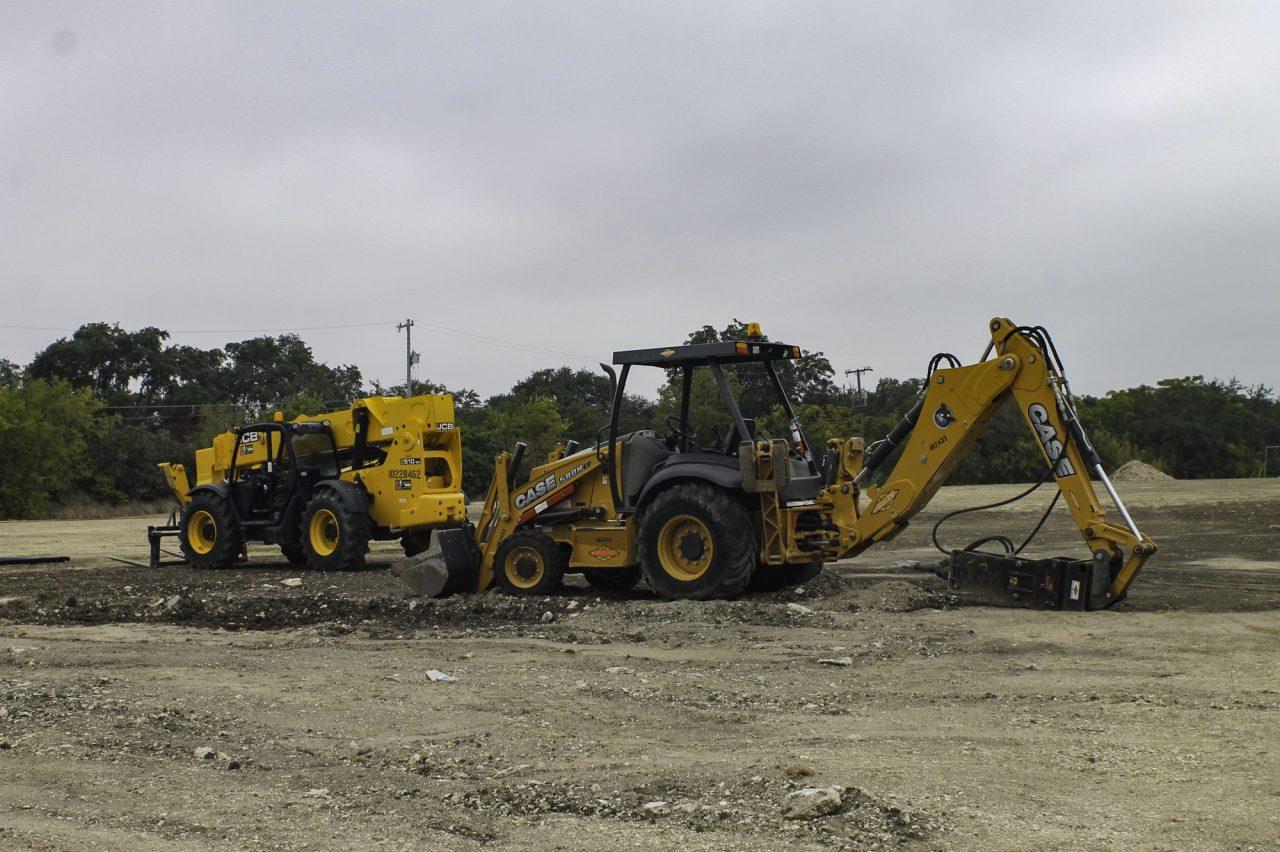Photo by Oliver Chapin-Eiserloh
In 2017, Trinity purchased the Oblate property located across from Thomas Residence Hall. Since the purchase, Information Technology Services (ITS) has moved into the building on the Oblate property, Trinity has started construction for a new track and field sports facility, and steps have been taken by Facilities Services to protect the endangered Robber Baron Cave Meshweaver spiders.
The Robber Baron Cave Meshweaver spiders live in underground caves. These spider caves are being protected by shelf fence, a barrier made of mesh, on the Oblate property. The spider caves have been monitored by Texas Parks and Wildlife for the past three years since they were discovered by the property owners.
“They aren’t open. They aren’t accessible. Texas Parks and Wildlife has capped two of the holes with a little air breather just for safety because these are big caves. One of the spider caves has an access door that Texas Parks and Wildlife has the key to,” said Jim Baker, senior director of Facilities Services.
Texas Parks and Wildlife was not required to sanction the construction.
“It wasn’t required because we didn’t technically build anything underground. It was all surface, but there’s still foundation,” Baker said.
Baker is overseeing the construction on the Oblate property. Because the grass field in Trinity Stadium was replaced with Astroturf over the summer, track and field throwing events can no longer be held on the football field. Instead, a portion of the Oblate property will be dedicated to these events. Construction of the turf used for the track runways began last week.
“It’s a combination cage, so it’s discus and hammer in the same protection cage, and then shot put and javelin each have their own small little runway and or walking path, so that’s what we’ve been doing at the Oblate property,” Baker said.
Now, Facilities Services is waiting for cooler weather to hydro-grow the grass at the Oblate property. Hydro–growing is a method used to grow plants using less water.
About two months ago, ITS moved into a preexisting building on the Oblate property in preparation for the Chapman-Halsell renovation. This building on the Oblate property was renovated this summer by Facilities Services.
Gordon Bohmfalk, university architect, has been working with Facilities Services to oversee the construction. Future renovations may also include replacing the wall along the property and Shook.
“The other activity going on there is the stone wall along Shook is leaning. We’re actually supporting that wall so that it’s not a danger, but ultimately, we’ll probably have to replace the wall because it can’t be repaired,” Bohmfalk said.
According to Gary Logan, vice president for Finance and Administration, the cost of renovations of the building that currently houses ITS on the Oblate property was $2.6 million.
“The funding for the project came from the unrestricted Facilities and Replacement Reserves, which is the primary reserve fund used for many renovation projects on campus,” Logan wrote in an email interview.
Logan does not have a breakdown of the costs for the other projects on the Oblate property. Dirt and grass removed from the football field were placed on the Oblate property to facilitate the growth of the new grass.
“The field leveling on the southern part of the property is the dirt removed from the football field as part of the artificial turf project. We are creating a space for throwing sports that cannot now take place on the artificial turf. Most of this cost was part of the football field turf, so I do not have a breakout of the project cost,” Logan wrote in an email interview.
In the Campus Master Plan, the Oblate property was slated to include parking lots. This is still in the discussion phase.
“One of the other things that we’re considering in the future is to add surface parking there so that would serve both the university and its dormitories and also its sporting events, so we’re considering that right now,” Bohmfalk said.
David Ribble, biology professor and associate vice president for Academic Affairs, explained that Trinity is legally prohibited from building over the endangered spider cave openings and to protect their natural habitat.
“Trinity has to respect that cave opening and not do anything. We wouldn’t want to put a parking lot right there because oil and stuff could come in,” Ribble said.
Bohmfalk explained how Trinity could work around this.
“There would be a setback around it which wouldn’t prevent too much. The idea is that you would keep natural turf and rainwater and things like that around it so you protect it,” Bohmfalk said.
To take advantage of the spider cave dwellings, Ribble is now looking to involve students in research that would be conducted by the San Antonio Zoo. This plan is in the discussion stage and would tentatively start next semester, according to Ribble.
“We are taking this opportunity to think about working with the San Antonio Zoo because the San Antonio Zoo has been very successful in establishing breeding protocols for species that live under similar circumstances,” Ribble said.
The breeding program would be operated primarily by the zoo.
“We’re starting to think about seeing if we might be able to get some kind of breeding program. It’s unfortunate that you have to do that, but these days any tools that we have for conservation we use, and that’s one of the tools,” Ribble said.
Though Trinity is required to not disturb the spiders’ natural habitat, they aren’t required to mark the cave locations. According to Baker, there will always be markings to make the spider caves known and to keep them safe.
“There will always be some kind of marks around the cave as long as we own the property just for clarity. So it’s not required, but I think it’s a good plan,” Baker said.







